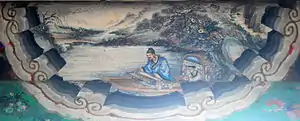Bo Ya
Bo Ya (伯牙, B.C.387-B.C.299[1]) was a Chinese musician. He was a qin player from the Spring and Autumn period or the Warring States period. He was known by his first name of "Boya", although his surname may have been Yu (俞), thus his complete name is sometimes given as Yu Boya (俞伯牙). The Lute Platform in Hanyang, Wuhan, China was where musician Yu Boya is said to have played. He is associated with the guqin pieces Gao Shan "高山" ("high mountains") and Liu Shui "流水" ("flowing water").

According to Qin Shi, Liezi said:
"Bo Ya was good at playing the qin. Zhong Ziqi was good at listening to the qin. When Bo Ya's will was towards high mountains in his playing, Zhong Ziqi would say, 'How towering like Mount Tai!' When Bo Ya's will was towards flowing water in his playing, Zhong Ziqi would say, 'How vast are the rivers and oceans!' Whatever Bo Ya thought of Ziqi would never fail to understand. Bo Ya said, 'Amazing! Your heart and mine are the same!' When Ziqi died, Bo Ya broke the strings [of his qin] and vowed never to play [the qin] again. Thus, there was the melody of High Mountains Flowing Water."
Bo Ya's story exemplifies the Chinese ideal of friendship. The term Zhiyin (知音, literally "to know the tone") has come to describe a close and sympathetic friend.
References
- Berthel, Ken. "How did Zheng Ziqi understand Bo Ya's Heart-Mind? Hetero-referential Aspects of Early Chinese Music Theory". Philosophy East and West.
- Please see: References section in the guqin article for a full list of references used in all qin related articles.